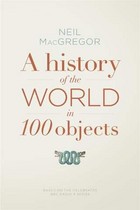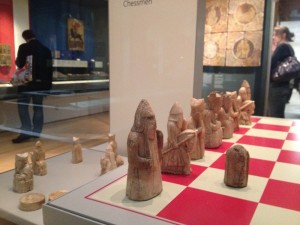 How can one write a history of the entire world? It’s not an easy task, and could never be accomplished by a single being. Dr. Neil MacGregor has opted to take the approach of presenting 100 objects from the British Museum, in chronological order, which pick out some of the strands of civilization’s history and which attempt to show us how everything is related and interwoven.
How can one write a history of the entire world? It’s not an easy task, and could never be accomplished by a single being. Dr. Neil MacGregor has opted to take the approach of presenting 100 objects from the British Museum, in chronological order, which pick out some of the strands of civilization’s history and which attempt to show us how everything is related and interwoven.
This is a very intriguing book, although as you would expect, it really only scratches the surface and is very, very top-level. The 100 objects are grouped in five for each chapter and tend to come from all over the world. It’s rare for there to be two objects from similar European countries, for example; this does provide a really interesting view of history as we can see what’s happening around the world all at once, even if that is at a surface level.
The objects in the book spread from civilization’s earliest hours to the present day, including a credit card and a solar-powered lamp. Even the author comments on how our choices of what may reflect our society today will not necessarily be the choices made in 100 years, and perhaps the curator in 2112 will be as intrigued by those selections as any others. History, it is fascinating, even more so when you consider the fact that it is happening all around us all the time.
All of the objects included are at the British Museum in London; they’re marked in the museum itself, so you can follow through and try and find all 100. I’m not sure if they were all on display, but I did visit a few on a recent visit to London. For example, here are the Lewis chessmen:
Even though the book has a gorgeous, full colour image of each object, it was still exciting to see a few of them in person, although not exciting enough for me to trek around the entire museum for it.
The British Museum is also a perfect subject because, in many ways, it reflects the overarching theme of a dominant culture taking over smaller ones, something that keeps happening throughout the book with lost civilizations. Sometimes their voices are heard again, as in the case of the Rosetta stone, but sometimes they are truly lost, and we can only speculate. The museum itself is a remnant of Britain’s imperial past, and these treasures may have been contested; the simple fact that they’ve ended up in London from all parts of the globe is a tale worth telling, and which is told for quite a few of them.
I spent a considerable amount of time with A History of the World in 100 Objects and I found it to be a fascinating read, easily digestible in chunks given the nature of the chapters. Not for anyone looking for an indepth history, but for a thoughtful overview, this is perfect.
I purchased this book.










This sounds so fascinating – I’ve been tempted by the podcast, but wanted to have the objects (or at least images) in front of me. This sounds like it could be a fun weekly project – go find the actual objects in each chapter (more bite-sized) and reflect. Maybe I’ll try that as a feature if I can make the time!
Thanks for the lovely review!
What a unique approach to history. The book sounds fascinating!
I have been considering this book for some time now, and wondering just how deeply each item and it’s repercussions on history are represented, and although you mention that this seems to be just a surface gleaning, it might be something that I would enjoy. I am going to have to look into it and see what I think of it. Fantastic review today, and thanks for including the photo of the Lewis chessmen!
I have this book, I couldn’t resist buying it after a trip to the museum. I am glad to see you enjoyed it, you’ve inspired me to give the book a go. Although I like history, I’ve been a bit intimidated by it’s size….
I LOVED this podcast and since then have really wanted the book. Have you listened to the podcast, too? It sounds from your review that you have not. I would be interested to know if the book is basically just a verbalization of the podcast, but with pretty pictures. In which case- I want it!
This sounds really interesting. There is a Canadian book of the same nature by Charlotte Grey (well, sort of the same. I haven’t read either book so it might be entirely different). Anyway, I really like the idea of this book and will add it to my wish list.
How long are the chapters? I ask because I’ve read books similar to this–History of Art in 1000 Objects, or something like that–and the essays were really too short to convey much history or information.
What an interesting concept
I wish I had this book when I lived in London. I spent quite a few hours in that museum.
Full disclosure: I have very defined (and mostly negative) opinions about the BM’s collecting and collections, both as an academic and a former museum professional. I’m listening to the podcast with one ear fully trained to the podcast-as-PR element which runs as an undercurrent through it and I also use that podcast in my teaching as a demonstration of supporting mission while supporting British political claims to the collection. That said, I do very much wonder how much time is spent in the book talking about *how* these 100 pieces got to the museum? Thus far the podcast has only made one throwaway mention of ‘controversy’ which it hasn’t addressed. (Plus the music they use in the podcast drives me absolutely nuts, but that’s just personal opinion!)
I’ve used their website with my class this year. It’s very good to. I have the book but haven’t made a stab at it yet.